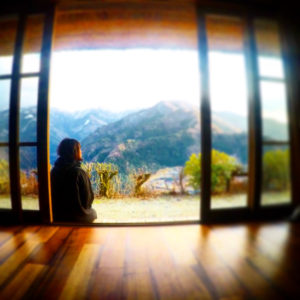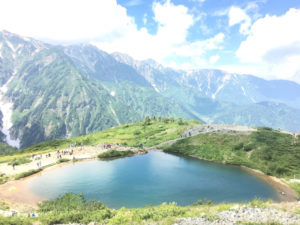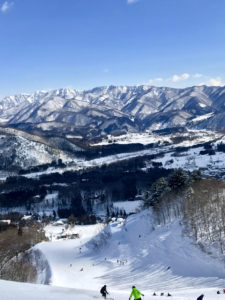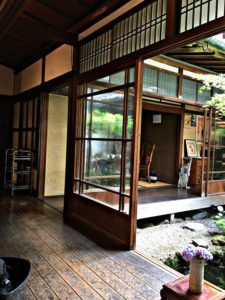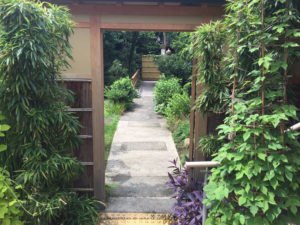(A view from Japanese kominka house, folk house)
Japan is facing the serious shortage of workforce and ageing problem.
How should this country cope with a serious population decline and sustain the vitality of its society and economy?
According to Yomiuri shimbun, the overall shortage is estimated to be 580,000 at present, and was projected to reach 1.45 million five years from now. After subtracting from these figures increases in the number of elderly and women workers and the like, a maximum of 47,000 foreign workers will be accepted in the fiscal year when the planned revisions of the immigration control law take effect, and up to 345,000 over the five years from the revisions.
The government and the ruling camp, led by the Liberal Democratic Party(LDP), will now shift their focus to a key bill to revise the immigration control law and create new residence status in order to allow Japan to accept more foreign workers.Time employed under new visas won’t count toward working period requirement for permanent residency.
The Justice Ministry does not intend to count time spent employed under one of two new visas set to be introduced spring 2018 when checking whether those who apply for permanent residency status meet requirements.One of the prerequisites for permanent residency in Japan is having five years of work experience in the country. But according to the sources, those working under the new proposed visa status — which will be available to individuals with considerable knowledge or experience in areas where human resources are lacking in the nation – will not be able to cite time spent under this status as working time when they apply for permanent residency.
The new visa, along with another type intended for individuals with more seasoned skills in areas similar to those under the first type, is aimed at making up for labor shortages in certain job categories, and will open the door to more foreign blue-collar workers.
In the meantime, the ministry is still considering how to handle time spent working in Japan under the second type of visa.
(Hakuba, Nagano prefecture)
The government submitted to the Diet a bill that would revise related laws to establish the two new visa types in April 2018.
Under the bill, those who fall under the category one will receive renewable visas for periods ranging from one to five years, for a combined total of five years, but will not be allowed to bring their families with them. The second new visa type (category two) will also be renewable, pending necessary checks, for as long as one’s employment contract is renewed. It will also let the recipient bring their spouses and children to the country.
Both statuses require applicants to have adequate Japanese language proficiency to get by in daily life. Those in the category one can apply to change their status to the category two type, if they fulfill the requirements.
In the meeting of the Lower House Committee on Judicial Affairs, Justice Minister Takashi Yamashita said the bill, if passed, would enable employers suffering from acute labor shortages to secure staffers who can immediately contribute to the workforce. Those applying for permanent residency under the ministry’s guidelines must fulfill requirements including good behavior, having adequate assets and skills to live in the country, and 10 or more years residing in Japan including at least five years under work visas. The time under the category one new visa type will be counted toward the residential requirement, but not the working period requirement. The bill to introduce the visas has already been deliberated in Lower and Upper House budget committees, where opposition lawmakers criticized the legislation for lacking clarity on details. The number of people that is expected to come to Japan is not clear but some reports say the government is expecting about 50,000 people per year will come. The Justice Minister repeated that the new systems are not meant to promote immigration, noting that they will not directly lead to permanent residency. However, in my opinion, the government’s hidden agenda is so obvious. PM Abe is under the enormous pressure from the business circles to address the shortage of workforce and he is just dodging the attack by insisting that the new system is not meant to promote immigration.
(Hakuba ski reports)
Here are Q&As between The Justice Minister and Sankei shimbun (right wing media)
Q What is the proposed amendment to the Immigration Control Law this time?
A This is a content to establish a status of residence that allows you to work in a simple labor field by making a major shift in the acceptance policy of foreign workers, which was limited to highly specialized human resources so far. Government will be formed at extraordinary Diet session and we aim to enforce on April 1 next year. In the background there is a request from the business community suffering from a serious labor shortage caused by the declining birthrate and aging population.
Q What kind of status of residence do foreigners currently working in Japan come to?
A There are five major classifications.
First, “specialized / technical fields”. This is for people who are in highly professional occupations such as engineers, language teachers, university professors, business owners, lawyers, doctors.
Next, “status based on family tree”. Residents such as Nikkei (people originally from Japan) residents, permanent residents who have Japanese spouses, etc., and there are no restrictions on activities and occupation selection. Although it is not a foreign national with a status of residence under the Immigration Control Act, special permanent residents such as so-called Korean residents in Japan also have no restrictions on their activities and they can work.
Thirdly, “technical internship”. Those are people staying in Japan with a foreign technical internship program aimed at international cooperation to developing countries through skill transfer and learning skills while getting paid for a certain period of time at farmers and factories.
Fourth, “specific activities”. They are nurse / nursing care worker candidates based on the Economic Partnership Agreement (EPA), people who are visiting by working holiday etc. The contents of activities that can receive compensation are limited.
Finally, “activities outside the status of qualification”. International students who work at a convenience store, a pub, etc. while attending school are allowed to work in the range that does not disturb the activities of the original status of residence (within 28 hours).
Q What kind of status of residence will be established in this revised bill ?
A We will establish a status of residence of “Specific Skill No. 1” for people with certain skills and “Specific Skill No. 2” for those with skilled skills. The first deadline is 5 years in total, and family nomination is not allowed. Number 2 can also be accompanied by spouse and child, and if you meet the conditions you can open roads for permanent residence.
Q What is the industry to apply ?
A After establishment of the revised bill, it is determined by the Ministry of Justice Ordinance. The government is examining target areas from 14 industries such as construction industry and agriculture, and we are making adjustments such as the number of people accepted by type of industry, but there are also possibilities of hundreds of thousands.
Q What are the concerns?
A If you accept a large number of foreigners in a short period of time, there is the possibility of causing division and exclusion of society, which can lead to deteriorating public security. How to cope with children’s education and social security, how to cope with the expectation of local suffocation right as the number increases.
Also, in the revised bill, the fee for foreigners’ compensation is equal to or greater than that of Japanese workers engaged in the same business, and the possibility of a competition for jobs with Japanese as a result of allowing job change in areas where employment is permitted.
Besides that, there are indications as to how the difference between “No. 2”, which is permitted for family to come and permanent residence, differs from immigrants, and how to adopt the consistency with the current system which allows free choice of occupation if they are settled.
Q Is not it a de facto immigration policy ?
PM Shinzo Abe expressed his view that it is not an immigration policy as “accept immediate fighting force with a due date in order to cope with a serious shortage of people.” However, in the United Nations we define immigrants as “people who have been in the birth or citizenship for more than a year”.
The points of the amendment to the Immigration Control Law are the followings.
(1) Establish a status of residence “specified skill”
(2) Accept foreigners with skills and Japanese ability within certain framework.
(3) For category 1, the period of stay is up to 5 years, and bringing family is not allowed
(4) However, if it is judged that applicant have high skills, those can bring your family and continue working.
Until now, LDP has defined immigrants differently and has been denying acceptance of immigrants. LDP calls only foreigners who are permitted permanent residence at the time of entering the country as “immigrants.” That is why LDP is avoiding discussing immigration policies from the beginning.
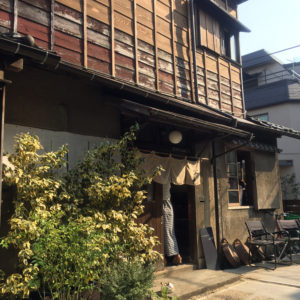
(Japanese kominka, folk house)
Final thought
It is interpreted that about 20 percent of the labor shortages will be covered by foreign workers.
I am cautiously supporting the change of immigration policy, however, in my opinion, Japanese society is not ready for the drastic change of this magnitude. We are very pragmatic ,however, maybe rather than committing to little considered program of drastic change, Japan should maintain as much flexibility and discretionary power as possible in immigration policy. We have to learn from Europe’s mistakes (even US’s mistakes)
For Japanese society it is true that measures to deal with labor shortage have become a major social problem. But PM Abe should not aim for the immediate goal of the Immigration Control Law revision proposal at this extraordinary Diet session but rather discuss the pros and cons of the underlying immigration acceptance over time and ask the public opinion. The pillars of the policy change are announced but it is not clear how to run the policy. Maybe it is it good idea to have the transition period be designed to allow time for Japanese people and the foreign nationals to reach some sort of comfort zone.
Regarding the number of foreign workers to be accepted, PM Abe gave a reply in the Diet, saying that the number “will be maintained as the upper limit over five years.”
The employment situation will also be greatly swayed by such factors as economic trends and technological innovation. The number should be regarded as just a yardstick and may need to be flexibly reviewed.
On the other hand, if the influx of foreign workers increases without control, there are concerns that this will cause turmoil at workplaces and disrupt the public order of local communities.
I would like the ruling and opposition parties to have a deep, deep discussion.
Does Japan really have to rely on foreigners ? (I think yes but it needs to be discussed from many angles)
For example, in the midst of labor shortage, there are various methods such as IT (information technology), AI (artificial intelligence), and using robot technology.
The government must make clear its criteria for judging and guidelines for application.
It seems that PM Abe does not provide any ideas of the guidelines at the moment and he is trying to pass the buck to each ministry. As for permanent foreigners, problems such as social security and employment of families will certainly occur. Detailed systems have not been discussed.
PM Abe’s strategy without guidelines/systems would jeopardize the policy at the grass root level and will inevitably cause a lot of social problems in the future.
It is important to establish a control office in the cabinet, thus eliminating the ill effects of bureaucratic sectionalism in ministries and agencies (which is globally notorious and bugging both Japanese and foreign nationals)
In the meantime, PM Abe has stealthily opened the window of the immigration of foreign high skilled workers in April 2017 without vehement protest from the opposition parties and medias. Japan is now offering the fastest green card in the developed countries for high skilled workers and you could get the green card within one year if you are eligible.
As for the impact on the real estate market, it will surely give the positive effect in the long run. When people move, the first thing they do is to find a home. The number matters so we have to wait and see how the number of migrants develop. Maybe it is good time to buy some akiya now ?
With fast-track permanent residency rule, Japan looks to shed its closed image (Japan Times)
Other Helpful Articles
Akiya (abandoned house) for sale, 50 mins from Tokyo : Is it really a good investment ?
FYI: The following article is taken from recent Asashi shimbun.
“Recent revelations have highlighted serious flaws and lapses in the way the government has prepared its policy initiative to allow more foreign nationals to work in Japan.These problems have called into question the credibility of what the government has said about the bill to revise the immigration control law. The bill would allow technical trainees now in Japan to switch over to the new “specific skills” visa status to be created with the revision to the law. The government expects that trainees who change their status will account for about half of the foreign nationals working in Japan under the new system.If so, the government needs to redo the process of pursuing this policy initiative by starting with efforts to obtain an accurate understanding of the grim realities of the trainee program, which would serve as a foundation for the new system.Another blow to the legitimacy of the proposal has come from an inconsistency between the government’s characterization of the bill and the ruling coalition’s version. In a TV program aired on Nov. 18 by Japan Broadcasting Corp. (NHK), Norihisa Tamura, deputy chairman of the ruling Liberal Democratic Party’s Policy Research Council, said the “specific skills” visa status is aimed at replacing the trainee programs with a formal and clearly defined employment program to allow foreign nationals to work in Japan. But this is news to us. The government has repeatedly said that the two systems are separate and different, promising to keep the trainee program alive even after the new visa system is introduced. But the lawmaker in a key post concerning the ruling party’s policy development has openly contradicted this explanation. This suggests that the government and the ruling party do not have a shared understanding of even the basic objective of the bill.The government is strictly responsible to ensure that sufficient time will be spent on deliberations on the proposed revision to the immigration control law and offer accurate and detailed explanations about the bill.”
Relevant articles in the media
Opposition ramps up criticism of new immigration law ahead of Lower House passage (Japan Times)
Shrinking Japan: Convenience stores counting on foreign workers to beat labor shortage (Mainichi shimbun)
Diet deliberations expose deficiencies in bill to accept more foreign workers (Mainichi shimbun)
(Traditional Japanese style gate)
Toshihiko Yamamoto
Real estate investing consultant and author.
Founder of Yamamoto Property Advisory in Tokyo.
International property Investment consultant and licensed
real estate broker (Japan).
He serves the foreign companies and individuals to buy and sell
the real estates in Japan as well as own homes.
He holds a Bachelor’s degree in Economics from
Osaka Prefecture University in Japan
and an MBA from Bond University in Australia
Toshihiko’s book, “The Savvy Foreign Investor’s Guide to Japanese Properties: How to Expertly Buy, Manage and Sell Real Estate in Japan”is now out on Amazon, iBooks (iTunes, Apple) and Google Play.
About the book
Amazon.com Link

